by Amy Brennan
On January 18, 2018 #G2Great was honored to have Thomas Newkirk as the guest host. Thomas Newkirk has long been an eduhero of mine, two of his books, Minds Made For Stories and Holding on to Good Ideas in a Time of Bad Ones greatly shaped my thinking and learning. His latest book is the one he joined us on #G2Great to discuss and I could tell as soon as I read the beginning pages it would be another book to impact me deeply.
In the beginning pages of his latest book, Embarassment and The Emotional Underlife of Learning Thomas Newkirk talks about the pages of the book being “the help we need, the voices we need to hear, the barriers we need to overcome.” He explores the “emotional underlife of teaching,” a topic that needs a space for analysis and discourse. As I read through the pages and reflected on the #G2Great twitter chat I came to realize this is exactly the book we need in education today.
I watch students and teachers silently struggle, not taking risks, hiding their embarassment by deflecting attention from teaching and learning to trivial topics that are mere distractions from the fear of revealing themselves. All of this because they fear the consequences of what comes by revealing their own struggles.
Share the Struggle
“I’ll go first.” Through the opening line in his book, Newkirk brings us into a story where he offers a narrative we can hold onto when he was young and experienced an embarssing moment in school. As educators, whether we are teachers, administrators or staff developers we need to follow Newkirk’s lead and say, “I’ll go first.” Sharing struggles and modeling how to talk about failure is the first step in suppporting all learners, whether they are adults or children. Too often educators and students do not feel comfortable revealing what they do not know or when they are learning something new that contradicts what they have been doing for so many years. This unfortunately is compouded because in education there is a perception that when you are at a certain point in your career or if you are a student and were always told you were “smart” – even the thought of revealing a weakness can be paralyzing. We tend to avoid situations that we perceive could show us failing, we believe if this does not go well and our weaknesses are revealed it will be a catastrophe. Embarassment silences learners, whether those learners are teachers in a professional learning setting or they are children inside a classroom. By acknowleding this emotional underlife of teaching we can begin share struggles and build safe spaces to be open about our own learning. We can give space to adults and children to try new things by giving time and space for students and teachers to talk – we can no longer allow the silence that comes from embarassment to hinder anyone’s ability to learn, whether they are adults or children. Model ways to ask for help, provide a sample of the language and be specific in the help you would like. We can start class, a professional development session or a faculty meeting with an “I’ll go first, let me share with you what I struggled with.”
Talk with the Team
My husband watches sports, every sport, all the time. I used to watch with him and now I just watch once in a while and with a completely different lens. Athletes and their audiences view mistakes or failures publicly and then move on immediately. Newkirk spoke with athletes and their coaches to better understand how they develop the capacity to face embarassment,move on and try again. In the moment athletes have to recover from setbacks, they have to clear their heads and try again. This is how they continue to take risks to perform their best. They do not let the embarassment lead to cautious and limiting behaviors. Newkirk points out that athletes have coaches and teams that support them and say it is ok, move on. They get past the failure. We need to be more like coaches and teams in order to create supportive environments where we learners can try, fail, try again and find success. We have to acknowledge that learning in education is just like sports, we may experience multiple iterations before we see success and likely we may suceed once in practice but when we are in the game, we might fail. We need to clear our head of that particular failure and try again. We can experience multiple iterations of something before we get it. We have to allow that for our students and we have to allow that for ourselves. Let’s talk with the team, create a safe environment where we can look at how we do something together and then support each other in moving past that to build the capacity to be resilient and not allow embarassment to get in the way of our learning process.
Frame the Fear
As I look at the walls of my family room I notice that they are adorned with frames with pictures of my family. Each one frames a particular moment in time, holding it as a precious memory of a time when… Those pictures capture a particular moment in time. You cannot tell from that one picture what happened before or after or even what I was thinking before or after. When looking at the word frame in reference to a movie or film which tells a longer story, the frame is a single one still photo that is part of a series that creates the film or video. If we can learn to frame the fear you can see what comes next and it does not have to be catastrophic. The more we push past the fear frame the more we will become reslient to failure and allow ourselves to try again which will ultimately lead to continued growth and learning. As we share the struggle with our colleagues and students and create spaces for ongoing talk with the team we can begin to frame the fear that we have for embarassment. It is then that we will be able to allow ourselves and our students to take risks as learners to grow.
Check out the Tweets below from the #G2Great chat.
If you want to explore this topic more or learn and read about Thomas Newkirk follow the links below:
Embarrassment: The Emotional Underlife of Learning by Tom Newkirk (Heinemann)
https://www.heinemann.com/products/e08877.aspx
Heinemann Blog: Tom Newkirk: On Writing Embarrassment—An Interview with Myself
https://blog.heinemann.com/on-writing-embarrassment-an-interview-with-myself/
Paul Hankins: “From Reflecting and Rejecting to Ringing In and Rallying In”
Embarrassment, it’s how we learn (video interview)
http://www.newscentermaine.com/article/news/local/207/embarrassment-its-how-we-grow/506947365
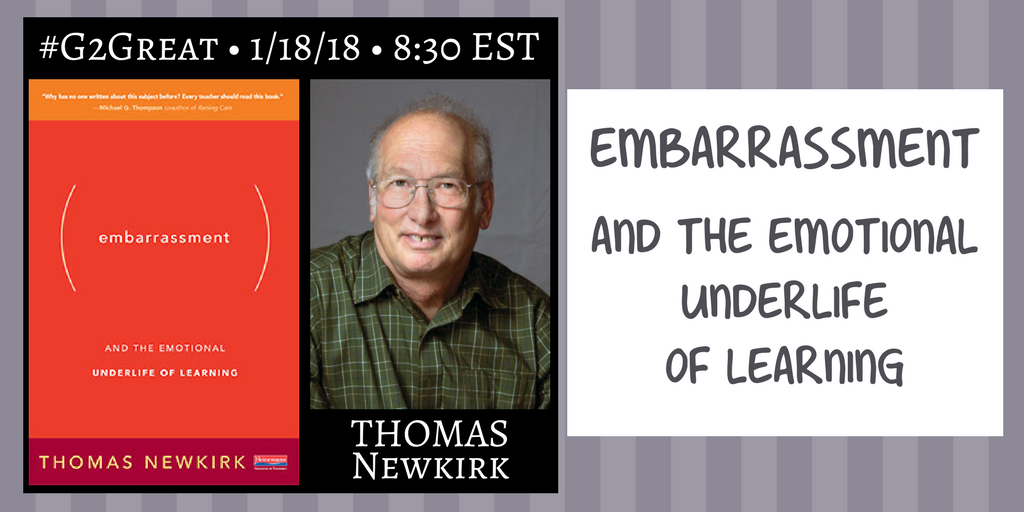

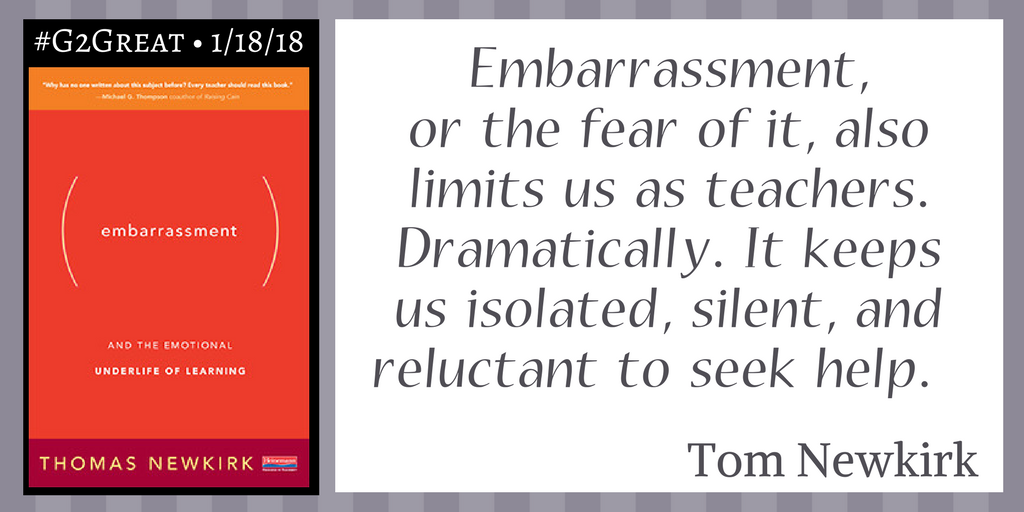
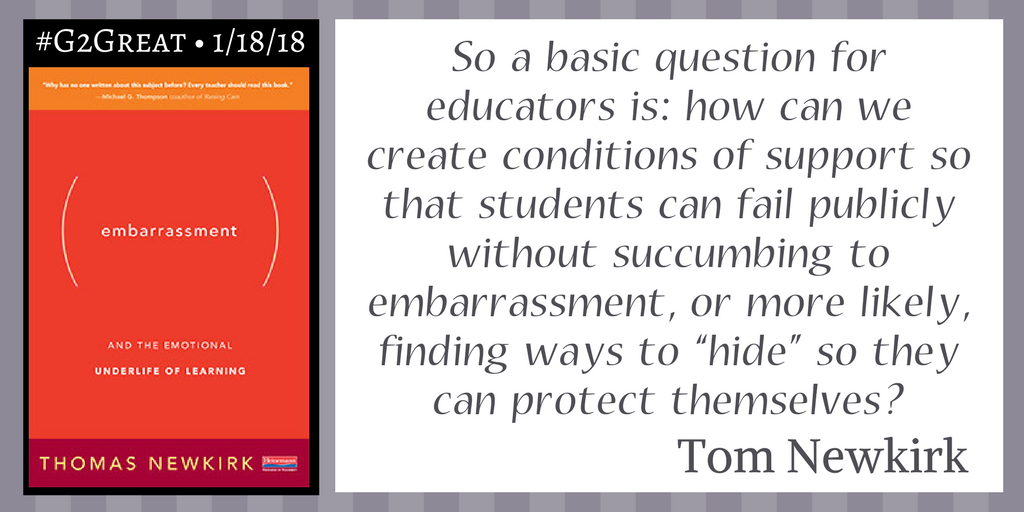



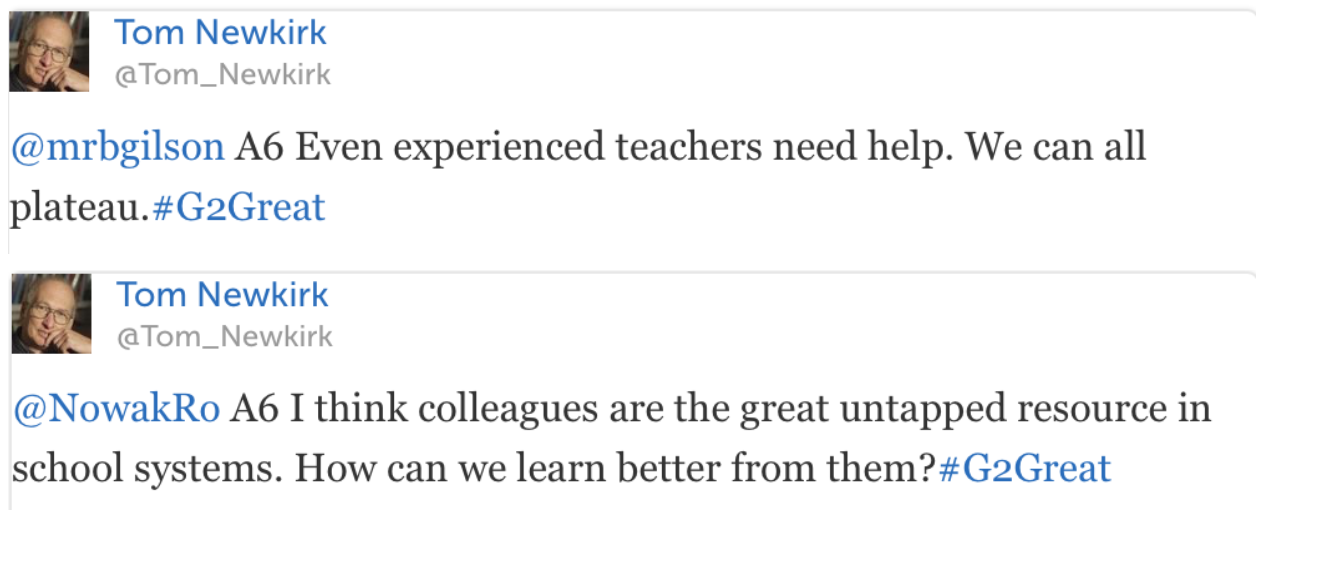
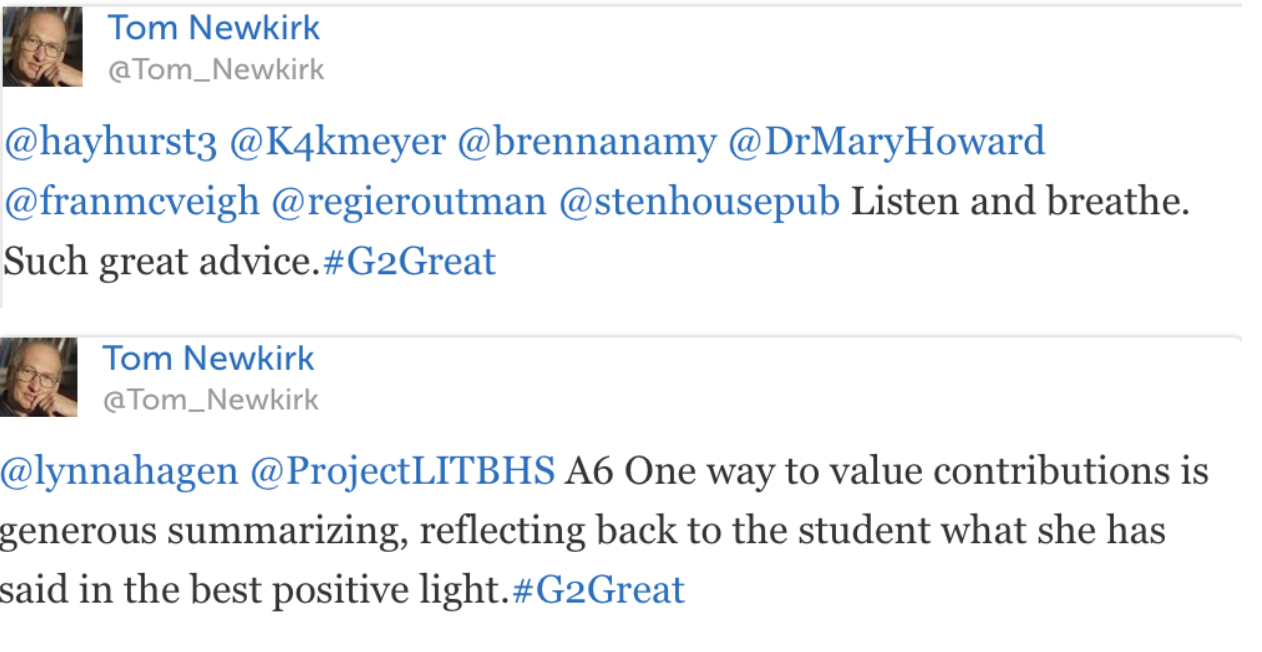
One thought on “Embarrassment and the Emotional Underlife of Learning with Thomas Newkirk”
Comments are closed.